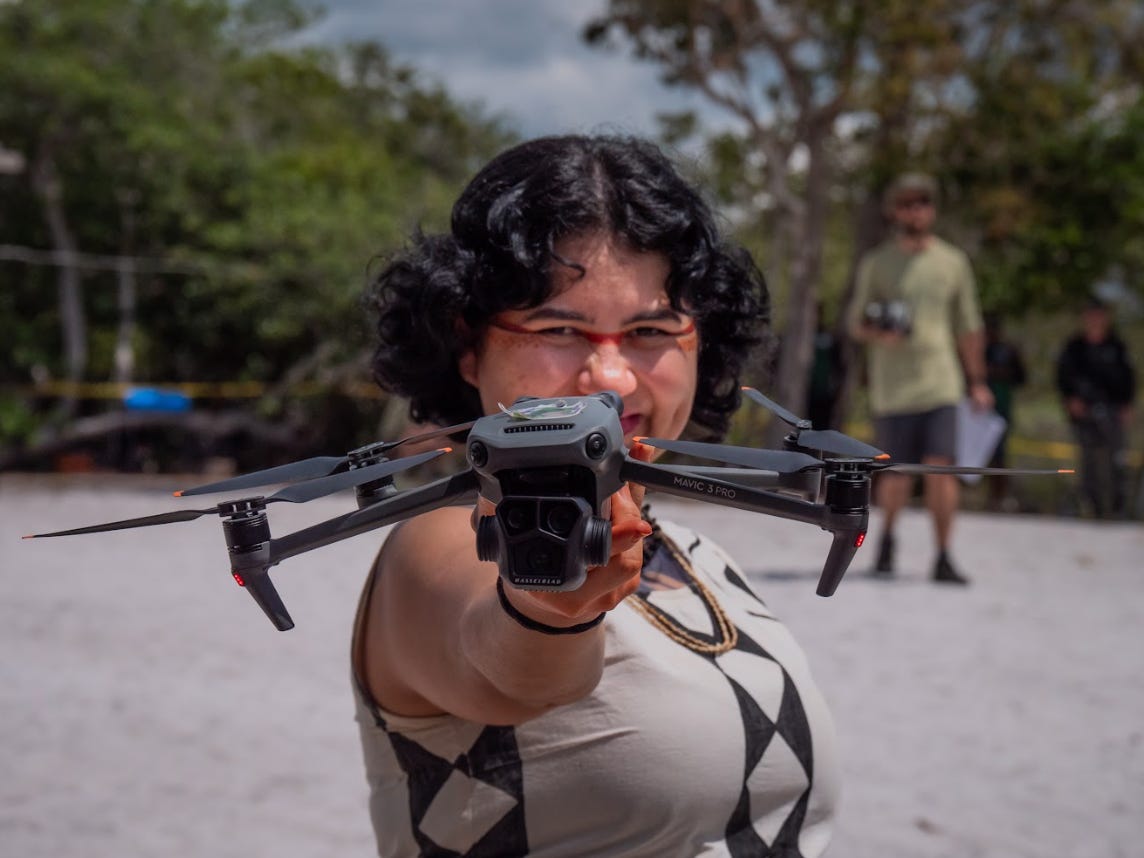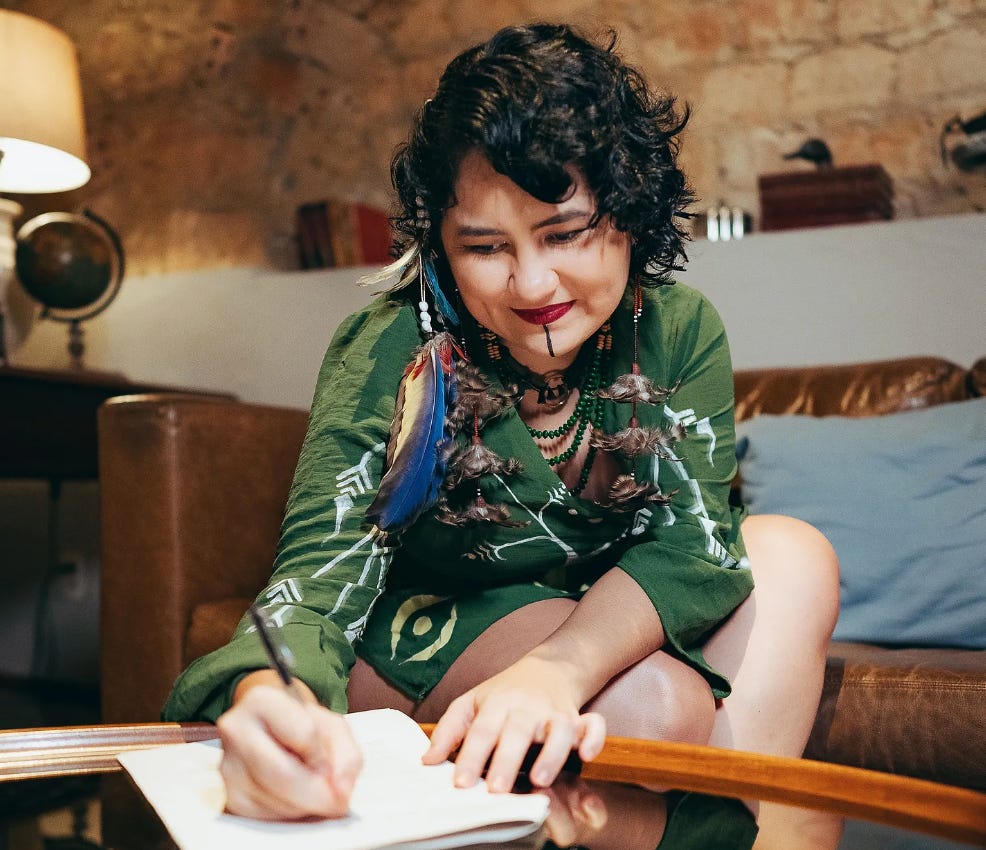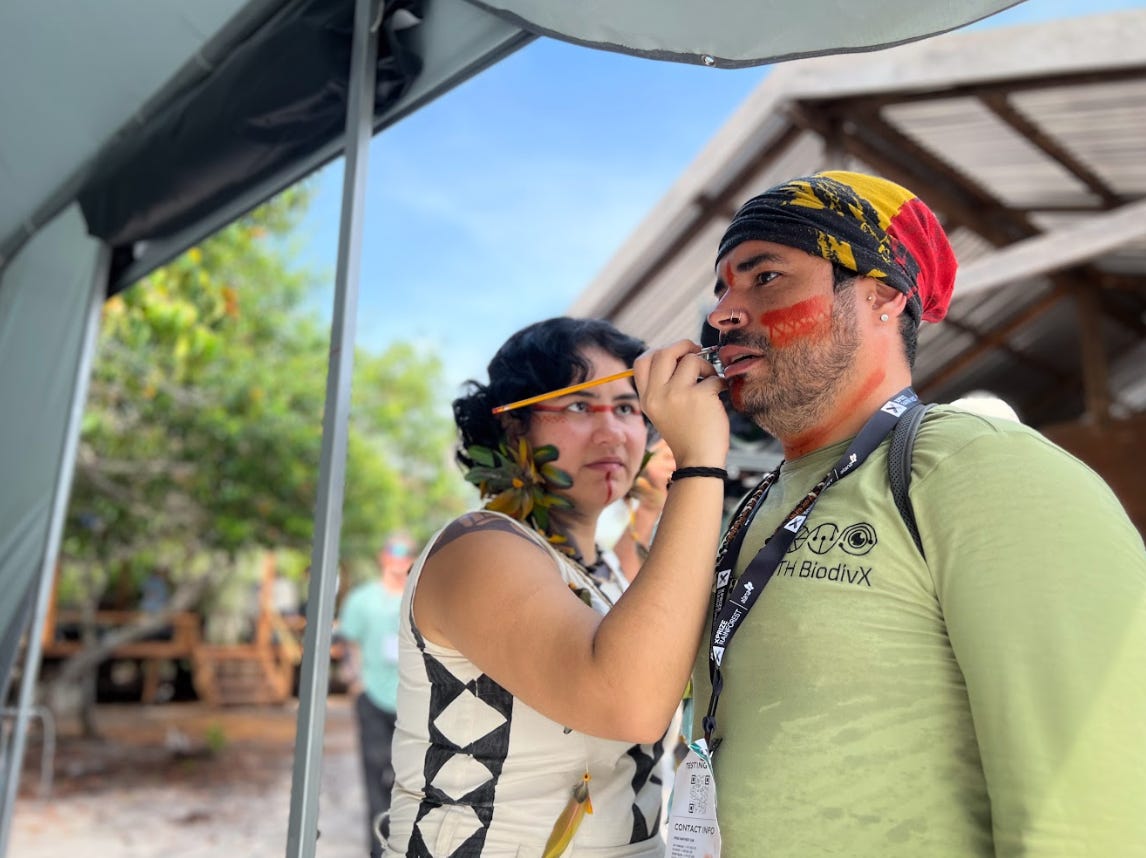Indigenous Field Notes from the Biodiversity Olympics
Field Notes from Marina Mura: An Indigenous Scientist's Account of the Rainforest XPRIZE Finals 2024
Preface
Before these pages fill with Marina's observations and experiences, a note on how these field notes came to be: In January 2024, I had come to the Amazon with a mission: to build bridges between technology and traditional wisdom, to find ways for Indigenous communities to lead scientific contributions about their home. Among the attentive faces that day, Marina's curiosity and insight stood out immediately. What began as a workshop attendance transformed into something far more meaningful. Marina became our vital link to local communities, not just translating words but building trust between worlds and localizing our technology. Marina is a member of the Mura Indigenous People and her natural leadership led to the formation of an Indigenous Data Council within our ETH BiodivX team, formalized through a benefit-sharing agreement. Our community partners chose her as their representative, and she evolved into something unprecedented in our team: our first Indigenous Scientist and a personal hero.
The pages that follow are Marina's unedited field notes during the XPRIZE Finals - observations, thoughts, and experiences captured through her unique lens as someone who understands both the whispers of the forest and the hum of technology.
by David Dao, Chief Scientist, GainForest.Earth
ETH BiodivX’s Indigenous Scientist Marina Mura during the XPRIZE Rainforest Finals in the Amazon, July 2024.
Field Notes by Marina Mura
translated from Portuguese
7th July, 2024, Reflecting on our Preparation Days
Marina signing our benefit sharing agreement on behalf of the Indigenous Data Council.
In January of this year (2024), after a devastating drought in Amazonas (2023), I had the opportunity to meet David Dao and Kamilla Camilo at a workshop in Parque das Tribos in Manaus. I was invited by a friend who knew I was interested in learning more about technology. I went to the workshop and was amazed by everything I saw and heard. Discovering what Artificial Intelligence was and how it was used was a major milestone in my life. At first, like all indigenous people present, I was afraid of technology - after all, it wouldn't be the first time outsiders tried to deceive us. But this was different; the technology was made for us, designed with us and our home, the Amazon rainforest, in mind. But what could I contribute to it? I couldn't speak English, had no higher education, and only knew about the forest and its secrets.
I invited the team to my village so they could see where these technologies would be used, meet the people who live under the trees, and understand where they would be working. That was my offer, but my village ended up falling in love with and embracing the "Dora" project, which we renamed "Taina, the guardian of the forest." The recorded sounds, the drones flying and showing our trees - it was all enchanting. At first, we thought it would be just another one of those unique moments where they would leave, take the technology and our knowledge, and never return.
But they came back with more equipment and more technology, and today my village knows that it's not ETH BiodivX entering the village, but members of our community, as equals, united by a single purpose. In April, they came for the second time, when I met Gabriel, a true Manauara (person from Manaus), who worked exemplarily with the team over the months. The village had a second chance to see more wonderful equipment: DNA collectors, more drones, insect identifiers, all integrated into a system for monitoring communities - not by them, but monitoring done by us. I was already familiar with the AudioMoth, a small device but with a great purpose: capturing the sounds of the forest. What we've learned most throughout our ancestry is to listen to and feel the forest; imagine being able to put that into a computer and identify each sound that nature makes - for me, it was a dream coming true.
But not only that - we in the village saw the equipment and shared our ideas about how to improve them or what to implement, and once again, the team took notes and returned to their countries with ideas and improvements to make. Today, we have greatly improved everything that was shown to us in January, and the hope is that this won't stay just in my community. I want to take it everywhere, monitor our lands, know the sounds of our forest, be able to see through technology what we need to improve, what we need to protect. We will have a foundation - now it's not just words in the wind, not just the indigenous voices of our ancestors echoing; they are images, dates, data that cannot be modified, with our names, with due recognition, and of course, with payment for them. I feel that now nothing can stop us; with technology and our knowledge, we can still save the Amazon.
14th July, 2024, Reflecting on the XPRIZE Finals
Marina painting team members shortly before the intense 24 hour data collection period of the XPRIZE finals.
At the beginning of the Journey so far…
We had a fun and very productive time in the Inhãa-bé village, team members went to test the equipment and drones and we made recordings to better present our project, with real people who actually use the technology, the tests were great, it was great training for everything, especially to always make a checklist before traveling.
Despite the delays caused by the scorching sun, we managed to align many things, I was impressed with what my village said about technologies and wanting it to continue, it's wonderful to see that I can keep them still active and wanting this to really work within our territory.
After that we returned to the city, and started distributing the roles, being chosen to speak to the judges took me by surprise, I was so new to the team, who worked on this for years, putting the responsibility of talking about my perspective, the value of the project is something very big that at first it didn't fit in my hands.
And this actually destabilized me, without technical knowledge, I had the feeling that I would be more of a hindrance than a help and this consumed me, making me late for the boat, even though I got up early and went early, I had to go back to my documents, and this only made me more nervous to see everyone waiting for me, I felt the heart of someone who didn't actually belong to a scientific community.
My boat trip was full of reflection, seeing the forest and the river I bathe in almost every day, missing my home and being at home. But also thinking about how being in this position can change not my life, but that of the young people I care for with so much love, the indigenous people and riverside people who I see fight daily for protection, if I can be 1% of a difference for them it will be worth it all.
After many reflections we arrived in Tumbira, we got the first warnings and the impact that "now there is no way to escape" came to my thoughts, but I was soon overcome by a sense of humor due to the rules, I am an indigenous person, on the riverbank of São Sebastião do Uatumã I've never entered the forest with boots or long pants, I laughed inside at so many protection recommendations, the forest doesn't attack those who enter it to do good, the snake only attacks those who don't know its way, foreigners wear visors because in its streets and signs you don't need to look in many directions, I've already entered the dense forest at 8 o'clock at night, without any lights in the rain, with a flip-flop on my foot, and found my way home without getting hurt. And this just makes me think about how much they don't know about those who live under the trees, asking an indigenous person not to have contact with the land is truly torture.
And that's it, my job is to take off their visors, so they can look around, know how to identify the fruits and leaves, know how to read the snake's path, know how to see beyond, where to step, where to touch, the forest doesn't It is a murderous being, whoever is afraid of what is inside them is unaware of all the beauty in the world.
I laughed at the rules, which showed extremely fearful snakes as possible causes of accidents. It was easier for someone to find a nettle than the plants they showed. But finally I was seeing a panel of people who perhaps had never even smelled the real forest.
But the best part was going to Toca do Tatu, despite the pregnancy sickness and the fear of getting sick and alarming the team, but at least I was useful in knowing the winds and clouds, warning about rain, my team maybe half of it I didn't believe in knowledge, but it didn't hurt to try.
At Toca do Tatu we lined up everything point by point, there were days of putting everything on the table and also connecting with the forest a little, I was well pampered by the girls who worked there, they were worried about my nausea and the food I could get to eat, even in a small conversation to say out loud that I loved tambaqui stew, they made it last night and I felt at home, I ate my pirão and my son liked it too, my nausea went away and I was able to eat well, food from the forest, traditional food, indigenous food, it was what I needed for what was to come.
The last morning I didn't want to leave, I was at home, there were people who spoke my language, the language of the forest, and they even gave our team the honor of choosing the name of the house we stayed in, and that's no small feat for a Such a special place as there, I will always go back there every year if possible, there will be my hiding place away from the city, a second home that I find.
Going to Tumbira again the feeling was different, a feeling that it was close to the end and I didn't need so much worry anymore. That is until we go to the field.
On the field I felt the tension of the place, it was actually a great forest, but being isolated by a line is kind of suffocating.
The start was given and the whole team started their duties, the judges started to arrive and I went with Kamila to help me show what I knew best, talk about Tainá and its platforms, but soon hunger and tiredness came, right? It's easy to be pregnant in the middle of the forest without being able to go and get something, and indigenous people really don't survive on peanuts, I ended up seeing tense moments among my team, the rain that almost came, I actually sang the songs they taught me to ward off evil, they came clearly into my mind to ward off the rain that was supposed to fall and disrupt everything.
And seeing my companions asking if it was going to rain made me happy, because they believed in me and my wisdom. I believe that in another one like this we need to separate the teams, we need to prepare the territory, we need to open the field to plant and at first I didn't see that. A refrigeration system was needed, a glacier to provide fresh food with ice water. These are basic things that would avoid unnecessary stress. But despite everything, it was a day with many samples collected, I was able to see better what my team worked on for years, some are unbelievable, a DNA laboratory in the middle of the forest, everything being done quickly and with agility, everyone there is incredible, people so incredible that perhaps they didn't know how important it was to see them there, monitoring, mapping and discovering everything about my ancestral home.
The end of the first day was tiring, but I was no longer so nervous, I tried to help as much as I could, I said everything that my knowledge allowed and I protected myself with all the power that was given to me, we returned to Tumbira tired but with our duty accomplished.
The second day started early for those who went first, I saw the movement of people at 3 am getting ready to go to the field, and when I woke up there were no longer so many with me, but I was sure that hunger makes people boring and impatient, Kamila and I started to convince the production of sandwiches, it was the only thing that in my head could help scientists in the middle of the forest since 4 in the morning. A snack and cold coconut water could lift the spirits. And arriving there around 10:30 in the morning they were really happy to see food, but we were happier to know that they had collected so many samples that they were already collecting more just to use the time that was still left.
Seeing our flag being waved from the top of the trees was also priceless.
Maybe my team doesn't know it yet, but they are already winners. They overcame their obstacles, their fears, their uncertainties, they overcame the lack of family, the lack of their culture for the greater good. I know that many were no longer comfortable, tired, stressed about everything, but they won, they came to the middle of the Amazon to try, even if just for 48 hours, to save a part of it. People like that are rare. They gave sweat, tears and even years of their lives for it. Tupã, the great creator of the forest, will mention your name in many villages.
The end was marked with lots of laughter, singing, emotion, 00:00:00 we were finally finishing the work, happy, with a shot of Jambucana, more Amazonian than that? Never! But I didn't go along with it, after all it was time to reveal that the next generation of scientists was coming, and this is my prize, a child who will know about ETH BiodivX and how important it was these days.
I think the main message of all this is to open your mind and your listening: the mind to understand that there are people who live under the trees, with different customs and rites, different languages, but who are still human beings and the listening so that understand past knowledge, that they can understand the power we put into our words, and that our knowledge is valid and needs to be heard.
The day the world understands that we are all descendants of the natives, not of colonizers or others based on appearance and status, we will learn to take better care of the land, to take care of it as the natives took care of it before gold, before money, to take care of our children's future home.




